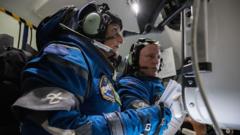NASA astronauts Butch Wilmore and Suni Williams, initially scheduled to return from the International Space Station (ISS) after a brief mission, now face an extended wait due to ongoing technical challenges with the Starliner spacecraft, developed by Boeing. Their return, originally planned for a week after their June launch, has shifted to late March or possibly April next year, as NASA delays the necessary crew rotation hoped to occur in February 2025.
NASA has reassured that this delay does not pose any risks to the astronauts. Their current supplies, bolstered by two recent resupply missions, ensure they have access to adequate provisions including food, water, clothing, and oxygen. "The crew is well-stocked with everything they need," NASA stated, also noting the arrival of special items for holiday celebrations aboard the ISS.
While missions typically last six months, some extending up to a year, experts believe this additional waiting period isn't detrimental. Dr. Simeon Barber from the Open University expressed that crew members likely have mixed feelings about missing the holidays back on Earth but remain dedicated to their work aboard the space station.
The delayed return home is linked to the preparation of a new SpaceX Dragon capsule, initially expected to launch in February. Although NASA considered employing another existing SpaceX capsule to expedite the transport of a new crew, they ultimately opted to wait for the new vehicle to ensure proper operations.
As the space agency balances operational readiness with its commitment to safety and protocols, Wilmore and Williams's unexpected extended mission will continue until the new crew arrives to facilitate their return.
NASA has reassured that this delay does not pose any risks to the astronauts. Their current supplies, bolstered by two recent resupply missions, ensure they have access to adequate provisions including food, water, clothing, and oxygen. "The crew is well-stocked with everything they need," NASA stated, also noting the arrival of special items for holiday celebrations aboard the ISS.
While missions typically last six months, some extending up to a year, experts believe this additional waiting period isn't detrimental. Dr. Simeon Barber from the Open University expressed that crew members likely have mixed feelings about missing the holidays back on Earth but remain dedicated to their work aboard the space station.
The delayed return home is linked to the preparation of a new SpaceX Dragon capsule, initially expected to launch in February. Although NASA considered employing another existing SpaceX capsule to expedite the transport of a new crew, they ultimately opted to wait for the new vehicle to ensure proper operations.
As the space agency balances operational readiness with its commitment to safety and protocols, Wilmore and Williams's unexpected extended mission will continue until the new crew arrives to facilitate their return.

















